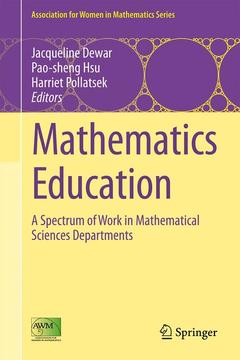Description
Mathematics Education, Softcover reprint of the original 1st ed. 2016
A Spectrum of Work in Mathematical Sciences Departments
Association for Women in Mathematics Series, Vol. 7
Coordinators: Dewar Jacqueline, Hsu Pao-sheng, Pollatsek Harriet
Language: English
Subject for Mathematics Education:
Publication date: 12-2016
Support: Print on demand
Publication date: 07-2018
Support: Print on demand
Description
/li>Contents
/li>Biography
/li>Comment
/li>
Many in the mathematics community in the U.S. are involved in mathematics education in various capacities. This book highlights the breadth of the work in K-16 mathematics education done by members of US departments of mathematical sciences. It contains contributions by mathematicians and mathematics educators who do work in areas such as teacher education, quantitative literacy, informal education, writing and communication, social justice, outreach and mentoring, tactile learning, art and mathematics, ethnomathematics, scholarship of teaching and learning, and mathematics education research. Contributors describe their work, its impact, and how it is perceived and valued. In addition, there is a chapter, co-authored by two mathematicians who have become administrators, on the challenges of supporting, evaluating, and rewarding work in mathematics education in departments of mathematical sciences.
This book is intended to inform the readership of the breadth of the work and to encourage discussion of its value in the mathematical community. The writing is expository, not technical, and should be accessible and informative to a diverse audience. The primary readership includes all those in departments of mathematical sciences in two or four year colleges and universities, and their administrators, as well as graduate students. Researchers in education may also find topics of interest. Other potential readers include those doing work in mathematics education in schools of education, and teachers of secondary or middle school mathematics as well as those involved in their professional development.
Part I, Benefitting the readers of this volume: Introduction (Jacqueline M. Dewar, Pao-sheng Hsu, Harriet Pollatsek).- Communication, culture, and work in mathematics education in the mathematics department (Shandy Hauk, University of Northern Colorado and WestEd).- Valuing and supporting work in mathematics education: A view from administration (Minerva Cordero-Epperson, University of Texas, Arlington & Maura Mast, Fordham University).- Part II, Benefitting pre-service and in-service teachers and graduate student instructors: A scholarly investigation of engaging future secondary teachers with authentic mathematics capstone projects: Impacts on the instructor and the students (Curtis Bennett, Loyola Marymount University).- By definition: The interplay between research and teaching future teachers about mathematical definitions (Elizabeth A. Burroughs and Maurice J. Burke, Montana State University).- Preparing PK-12 mathematics teachers: How one department used mathematics education research to shape mathematics students’ knowledge (Yvonne Lai, Wendy M. Smith, and Nathan Wakefield, University of Nebraska, Lincoln).- Lessons Learned from a Math Teachers’ Circle (Katherine Morrison, University of Northern Colorado).- Transforming practices in mathematics teaching and learning through effective partnerships (Padmanabhan Seshaiyer, George Mason University & Kris Kappmeyer, Arlington Public School District).- Developing true collaborations between teachers, mathematicians, and mathematics educators (Kristin Umland, University of New Mexico).- Part III, Benefitting STEM majors: Finding synergy among research, teaching, and service: An example from mathematics education research (Megan Wawro, Virginia Tech).- Communicating mathematics through interdisciplinary writing and speaking assignments (Suzanne Sumner, University of Mary Washington).- Using data-enhanced classroom experiences to engage student learning (Talithia D. Williams and Susan E. Martonosi, Harvey Mudd College).- Helping students gain abstract understanding through concrete work using GeoGebra (Kathy Tomlinson, University of Wisconsin - River Falls).- A discovery approach to abstract algebra using laboratory experiences (Ellen J. Maycock, Depauw University).- A scholarly investigation of a department-wide effort to connect mathematics and the world (Melanie Pivarski, Barbara Gonzalez and Steve Cohen, Roosevelt University).- Building a community of women in mathematics: The Summer Mathematics Program for women undergraduates at Carleton College (Pamela Richardson, Westminster College).- Part IV, Benefitting students in general education courses: Developing a quantitative reasoning course: a case study (Kathleen Lopez, University of Louisiana, Lafayette).- Discovering the art of mathematics (Christine von Renesse, Westfield State University).- Ethno-mathematics: A study of mathematics in pre-Columbian cultures (Ximena Catepillán, Millersville University).- Writing for quantitative literacy (Maria Fung, Worcester State University).- Tactile mathematics: Helping students learn (Carolyn Yackel, Mercer University).- Incorporating write-to-learn activities in Statistics classes (Katherine G. Johnson, Metropolitan State University).- Mathematics for all: Mathematics of social justice (Priscilla Bremser, Middlebury College).- Part V, Benefitting the public and the larger mathematical community: The Simpsons, Futurama, and more (Sarah Greenwald, Appalachian State University).- Transforming post-secondary education in mathematics (Tara Holm, Cornell University).- Epilogue: Reflections by the Editors.
Pao-sheng Hsu is an independent mathematician and consultant. She earned her Ph.D. in Mathematics from the Polytechnic University (previously the Polytechnic Institute of New York, now the New York University Tandon School of Engineering). She has served as a reviewer for zbMATH since 2002.




